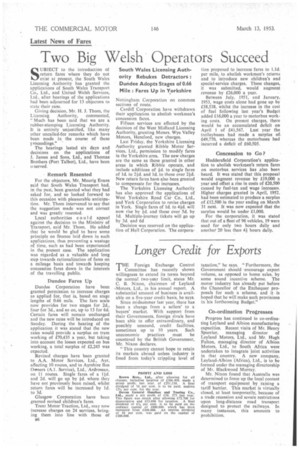Longer Credit for Exports 'T'HE Foreign Exchange Control I Committee
Page 40

If you've noticed an error in this article please click here to report it so we can fix it.
has recently shown willingness to extend its terms beyond the normal two-year limit, states Mr. C. B. Nixon, chairman of Leyland 'Motors, Ltd., in his annual report. A substantial amount of business is available on a five-year credit basis, he says.
Since midsummer last year, there has been a change from a sellers' to a buyers' market. With support from their Governments, foreign rivals have been able to offer extraordinary, and possibly unsound, credit facilities, sometimes up to 10 years. Such uneconomic practices must be countered by the British Government, Mr. Nixon declares.
"This country cannot hope to retain its markets abroad unless industry is freed from today's crippling level of taxation," he says. "Furthermore, the Government should encourage export volume, as opposed to home sales, by some sound incentive scheme. The motor industry has already put before the Chancellor of the Exchequer proposals for such a scheme, and it is hoped that he will make such provisions in his forthcoming Budget."
Co-ordination Progresses
Progress has continued in co-ordinating Leyland and Albion manufacturing capacities. Recent visits of Mr. Henry Spurrier, managing director of Leyland Motors, Ltd., and Mr. Hugh Fulton, managing director of Albion Motors, Ltd., to South Africa were undertaken to integrate joint activities in that country. A new company, Leyland-Albion (Africa), Ltd., is to be formed under the managing directorship of Mr. Blackwood Murray.
Mr. Nixon found that Australia was determined to force up the local content of transport equipment by raising a tariff barrier. This market is virtually closed, at least temporarily, because of a trade recession and severe restrictions upon long-distance road transport designed to protect the railways. In many instances, this amounts to prohibition.




















































































